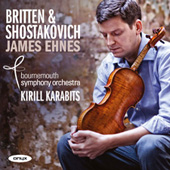
ESSENTIAL RECORDINGS

Dmitri Shostakovich (1906-1975) and Benjamin Britten (1913-1976) had several things in common in addition to being near contemporaries. During their lifetimes they were considered "modern" and therefore difficult. They were
contemporary, of course, and that was another red flag designation. Yet their music falls into the mainstream of musical evolution and is not taxing in the manner of, say, Pierre Boulez or Karlheinz Stockhausen. Britten and
Shostakovich were friends, but the sounds of their music were distinct from one another. This CD demonstrates their very personal voices nicely with a violin concerto each.
Not all of Britten's music is as desolate as this concerto, but not all of it is as achingly beautiful either. It was written in 1938-1939 (near Joliette Québec, as it happens) when the composer was twenty-six. A kind of Spanish rhythm that
appears now and then, especially in the first movement, may be a reflection of the Spanish Civil War. It was going the wrong way according to most intellectuals, but it seems doubtful that the concerto was written with that specific a
focus. Music is "about" itself, and whatever reaction an experienced listener brings to it is the correct one.
The concerto is in the customary three movements, but there is nothing customary about the movements individually. Perhaps the most beautiful and, yet, desolate one is the finale, a long, well-argued passacaglia and the extended
cadenza that bridges it from the second movement. And here we have two things that the Britten and Shostakovich concertos have in common: Each has a passacaglia movement and the last two movements of each are connected by
long cadenzas. The passacaglias are of similar feeling, one of loneliness and yearning. This is their closest point of commonality.
Otherwise, the Shostakovich seems more concerned with suppressed fury and black humour. It is in four movements, five if you count the long and wonderful cadenza. The drama and power of this concerto is comparable to that in his
best symphonies. And if it has a gravity specific to Shostakovich, it is not a despairing work.
For many years the Britten was represented on records by only one major violinist, Ida Haendel. Interestingly her recording featured the same orchestra as this new one by James Ehnes. Under Paavo Berglund it sounded pretty good. Under
Kirill Karabits it sounds better, but the credit need not be assigned exclusively to the conductor. The orchestra seems to have a greater maturity and the recorded sound is more detailed and sympathetic to the score.
Comparing Ehnes with Haendel is a daunting task. They sound somewhat alike in that neither attempts to dress up the score with interpretive events. Among the other differences, Haendel takes the passacaglia more slowly, but Ehnes
doesn't lose any feeling with his brisker tempo. Questions of recorded sound aside, I prefer the Ehnes just a little. There have been several recordings in between, my favourite being Janine Jansens' paired with the Beethoven concerto.
As for the Shostakovich, there are quite a few recordings available, but Ehnes' ranks among the best.
Richard Todd - July 2013